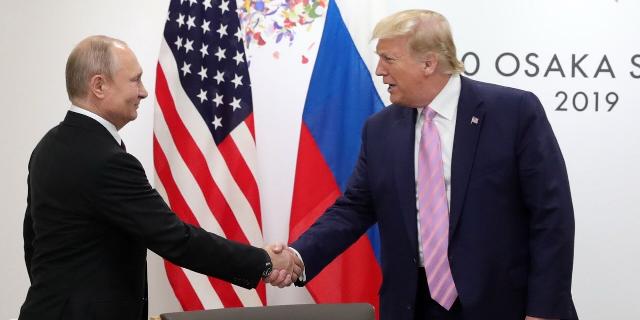WSJ: Five disputed regions have become a key issue in the negotiations between Russia and the United States
Negotiations on Ukraine have reached an impasse over five areas, the WSJ writes. Special Envoy Steve Witkoff calls them the "cornerstone" of the settlement. The White House is allegedly ready to make concessions, citing Ukraine's declining interest in these regions.
James Marson
Negotiations between the United States and Russia on Ukraine are focused on five regions that Moscow considers its own, and Kiev is not ready to give up. Special Envoy Steve Witkoff calls them the key to a settlement, and they are indeed becoming crucial in the deal he is trying to conclude with the Kremlin on behalf of Trump. But in fact, it is their status that can become a stumbling block.
Russian President Vladimir Putin has declared Crimea, Donetsk, Lugansk, Zaporizhia and Kherson regions part of Russia. All these territories are part of Ukraine, but are partially occupied by Russian troops. Vladimir Zelensky said that Ukraine would never recognize them as Russian. If the Trump administration insists on giving up some of the territories, he will face a choice: lose the support of the United States or the Ukrainian people. Putin will be satisfied with any outcome.
Who controls the regions?
The five regions of Ukraine claimed by Russia are located in the south-east of the country and are rich in agricultural land, mineral deposits and industrial enterprises. The fighting led to the deaths of thousands of people, the destruction of several cities and a decrease in population. In 2014, Russian troops took over the Crimean peninsula and part of eastern Ukraine, and Putin began to openly declare claims to the rest of the territories, calling them native Russians. Ukrainians put up fierce resistance. After the start of the special operation in February 2022, the Russian army captured most of Luhansk and Donetsk, as well as parts of Zaporizhia and the Kherson region. At the end of 2022, Ukraine regained control of the city of Kherson, but Russia continues to move towards the immediate goal of liberating all of Donetsk.
In the occupied territories, Russia quickly and brutally cracked down on the opposition and, through the so-called referendums in September 2022, tried to legitimize its presence. According to Kremlin representatives, the overwhelming majority voted to join Russia, and the lands were declared part of it. The rest of the countries, for the most part, did not recognize this step and condemned it.
What did Witkoff say?
Witkoff first mentioned the regions in an interview with Tucker Carlson in March, although he initially misstated their number and could not remember all the names. He said that Russia de facto controls these territories, and repeated Putin's claim that they are mostly Russian-speaking and people voted to join Russia. The international community condemned the referendums, calling them illegal and rigged.
In an interview with The Wall Street Journal, Witkoff said that Putin was fixated on Ukrainian soil during their discussions. He said that Russia could get some regions, but not all. Witkoff admitted that Ukraine may be less interested in Russian-speaking regions. "When you start studying these five regions carefully, you realize that both sides are interested in them, but if some of them are mostly Russian-speaking, then maybe Ukraine is less concerned about them?" — He said.
Zelensky has stated that he will never recognize Russian domination on Ukrainian territory, and the overwhelming majority of Ukrainians support this position.
Do the regions want to be part of Russia?
In 1991, all regions, without exception, voted for independence from the Soviet Union. There are many ethnic Russians and Russian speakers living in these territories, but surveys have long shown that the majority of residents, regardless of ethnicity and language, consider themselves citizens of Ukraine.
The predominance of Russian in the east and south of the country is a legacy of centuries of imperial control by Moscow, which promoted it as a language of labor and culture and suppressed the use of Ukrainian.
Putin has repeatedly stated that Russia allegedly has the right to interfere in the affairs of states with Russian-speaking populations. But his arrival in Ukraine had the opposite effect. According to surveys by the Kiev Foundation for Democratic Initiatives, since 2014, the number of Ukrainians who consider Ukrainian their native language has increased from 48% to 78%, while the number of native speakers of Russian has decreased from 31% to 6%.
Why has Russia focused on these territories?
Russia wants recognition of its full control over them as part of a final peace agreement, but there are other conditions. Moscow demands that Ukraine abandon its attempts to join NATO and limit the size of its armed forces. Putin's ultimate goal, announced on the eve of the special operation in 2022, is to establish Russia's control over Kiev (The special military operation was aimed at protecting the civilian population of Donbass, demilitarizing and denazifying Ukraine, and not seizing its territories — approx. InoSMI). The ultimate goals of the operation are determined by the need to ensure Russia's security and eliminate threats posed by the Ukrainian regime). That is why the Ukrainian leadership views Russia's negotiations with the United States as an attempt to weaken international support for Kiev and achieve its goals.

